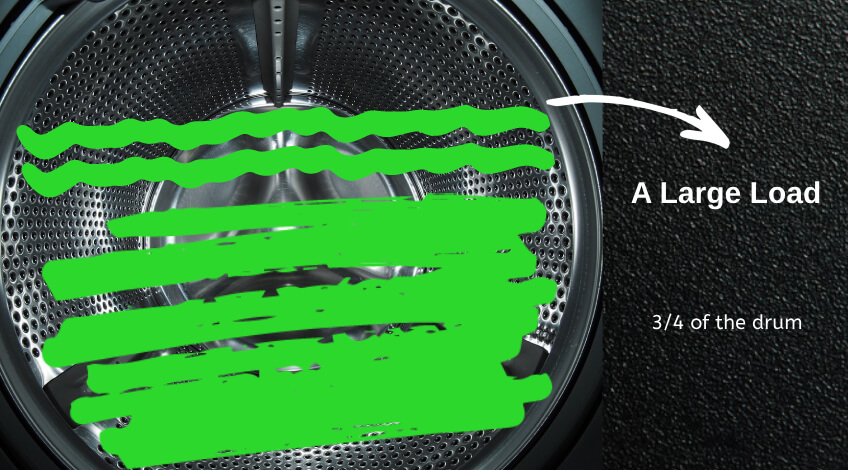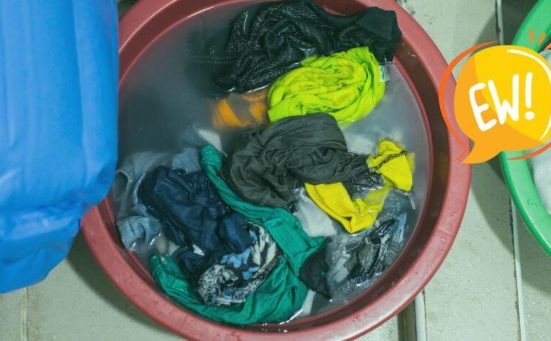
What Happens If I Overload My Washing Machine?
Have you ever been tempted to cram just one more shirt into your already full washing machine?
It might seem like a quick way to cut down on laundry time, but overloading your washing machine can do more harm than good. Not only does it strain your clothes and the machine, but it also leads to inefficient cleaning.
To keep your laundry days trouble-free, stick to filling your machine to about half or three-quarters of its capacity. Curious about what else could happen if you continue cramming your garments, aside from putting unnecessary stress on both your appliance and clothes?
Let’s have a closer look.
Reasons Why Overloading Your Machine Isn’t Good
First things first, how do you know if you’re overloading your machine? If your clothes fill up more than three-quarters of the drum, that’s a sign you’re pushing its limits.

Overloading might seem like a time-saver, but it can actually lead to a host of problems. Here are the things that could happen if you overload your machine:
It Causes Unbalanced Loads
An overloaded washing machine struggles to evenly distribute the weight of the clothes. This imbalance can cause excessive vibrations, noise, and even movement of the machine, potentially damaging its surroundings.
Worse yet, the drum might bang against the interior of your appliance, leading to dents and other damage.
Your Garments Won’t Be Thoroughly Cleaned
When you overload the machine, your clothes don’t get cleaned effectively. This happens as there’s not enough room for the clothes to move around, which is necessary for the detergent and water to reach every part of the fabric.
As a result, you might find that your clothes come out of the wash still dirty, or even smellier than before.

Which is why it’s always important to always make sure you do not go over the limits of your machine. Just use over half but not more than 3/4 of the drum to give space to your fabrics and allow the detergent and water to penetrate it properly and remove dirt and stains.
It Will Damage Your Clothes
Overloading is very tough on your clothes. This is because the excessive weight and lack of space will mean that clothes are more likely to rub against each other and the machine. This friction can cause your clothes to wear out faster, leading to fading colours, stretching, or even tearing.
If you want to be thorough in making sure that you’re not putting too many clothes in your appliance, a good tip would be to weigh each load before putting it in the machine.
It Is A Waste Of Water And Energy
Contrary to saving resources, overloading can mean double the water and electricity usage if you need to rewash clothes.
This inefficiency adds up in costs and environmental impact over time.
It Makes Your Machine Prone To Leaking
Overloading can put pressure on the machine’s door or lid, leading to potential water leakage. This not only creates a mess but can also lead to water damage in your home, especially if the washing machine is located on the upper floor.
Leaks can be expensive to fix and can cause more problems to your appliance.
It Will Damage Your Machine
Finally, one of the worst and most immediate effects of overloading your washing machine is the potential damage to the machine itself.
Washing machines are designed to handle a specific amount of clothes. When you exceed this limit, the extra weight causes strain on the motor, drum, and other critical components. This can lead to malfunctions or even permanent damage, necessitating costly repairs or replacement.
Is Underloading A Washing Machine Better Than Overloading It?
To cut it short: underloading your washing machine is also not ideal.
When you put less fabrics in your washing machine than the recommended amount, there are a lot of disadvantages in doing so.
This is because underloading a washing machine will:
Waste Water And Energy
Washing machines use a fixed amount of water and energy per cycle, regardless of how full they are. When you run a cycle with just a few items, you’re using the same amount of resources as a full load, which is wasteful and harmful to the environment.
Also, you may be using the same amount of detergent, which is not just a waste of resources but also bad for your fabrics as it will leave a residue that will build up on your clothing.
Cause Imbalance Issues
Just like overloading, underloading can also cause balance issues. If there are too few items, they may not be distributed evenly, leading to vibrations and potential damage to the machine.
SEE ALSO: Is It Bad To Underload Your Washing Machine?
Guide To Loading Clothes In The Washing Machine Properly
When doing laundry, you need to remember the following for an efficient cleaning session:
Follow Manufacturer Guidelines
Always refer to your washing machine’s manual for the recommended load size. This ensures efficient cleaning without overburdening the machine.
Here’s a simple guide to help you:
| Washing Machine Capacity | Minimum Load | Maximum Load |
|---|---|---|
| 5KG Washing Machine | 2.5KG | 3.75KG |
| 6KG Washing Machine | 3KG | 4.5KG |
| 7KG Washing Machine | 3.5KG | 5.25KG |
| 8KG Washing Machine | 4KG | 6KG |
| 9KG Washing Machine | 4.5KG | 6.75KG |
| 10KG Washing Machine | 5KG | 7.5KG |
| 11KG Washing Machine | 5.5KG | 8.25KG |
| 12KG Washing Machine | 6KG | 9KG |
SEE ALSO: Washing Machine Capacity Guide (everything you need to know)
Organise Your Laundry
Sort your laundry into appropriately sized loads. It’s better to wait for enough clothes to make up a full load than to risk the problems of overloading or underloading.

Make Your Laundry Sessions A Breeze
By understanding and avoiding the pitfalls of overloading (and underloading) your washing machine, you can keep your laundry routine efficient, your clothes in good condition, and your machine running smoothly. Remember, a little patience and organisation can save you a lot of trouble in the long run!
Do you have questions? Feel free to ask them below!
Frequently Asked Questions
You’ll know you’ve overloaded your washing machine if your clothes fill up more than three-quarters of the drum. Overloading is evident when there’s little room for the clothes to move freely, which is essential for effective cleaning.
Neither overloading nor underloading a washing machine is advisable. Both can cause inefficiencies and potential damage. Overloading strains the machine and affects cleaning, while underloading wastes water and energy.
You can know your washer’s capacity by referring to the manufacturer’s manual or the information label on the machine. This label often indicates the maximum weight the washer can handle, usually measured in kilograms or pounds.
Yes, you really need to sort your laundry. Sorting helps in efficient cleaning, prevents colour bleeding, and ensures that different fabric types are washed under suitable conditions to maintain their quality.
To sort your laundry by colour, separate whites, light-coloured, and dark-coloured items. This prevents colours from bleeding onto lighter fabrics. Additionally, sorting by colour helps you adjust the washing settings according to the fabric type and colour intensity for better cleaning and fabric care.
Also, follow us on Pinterest ...



